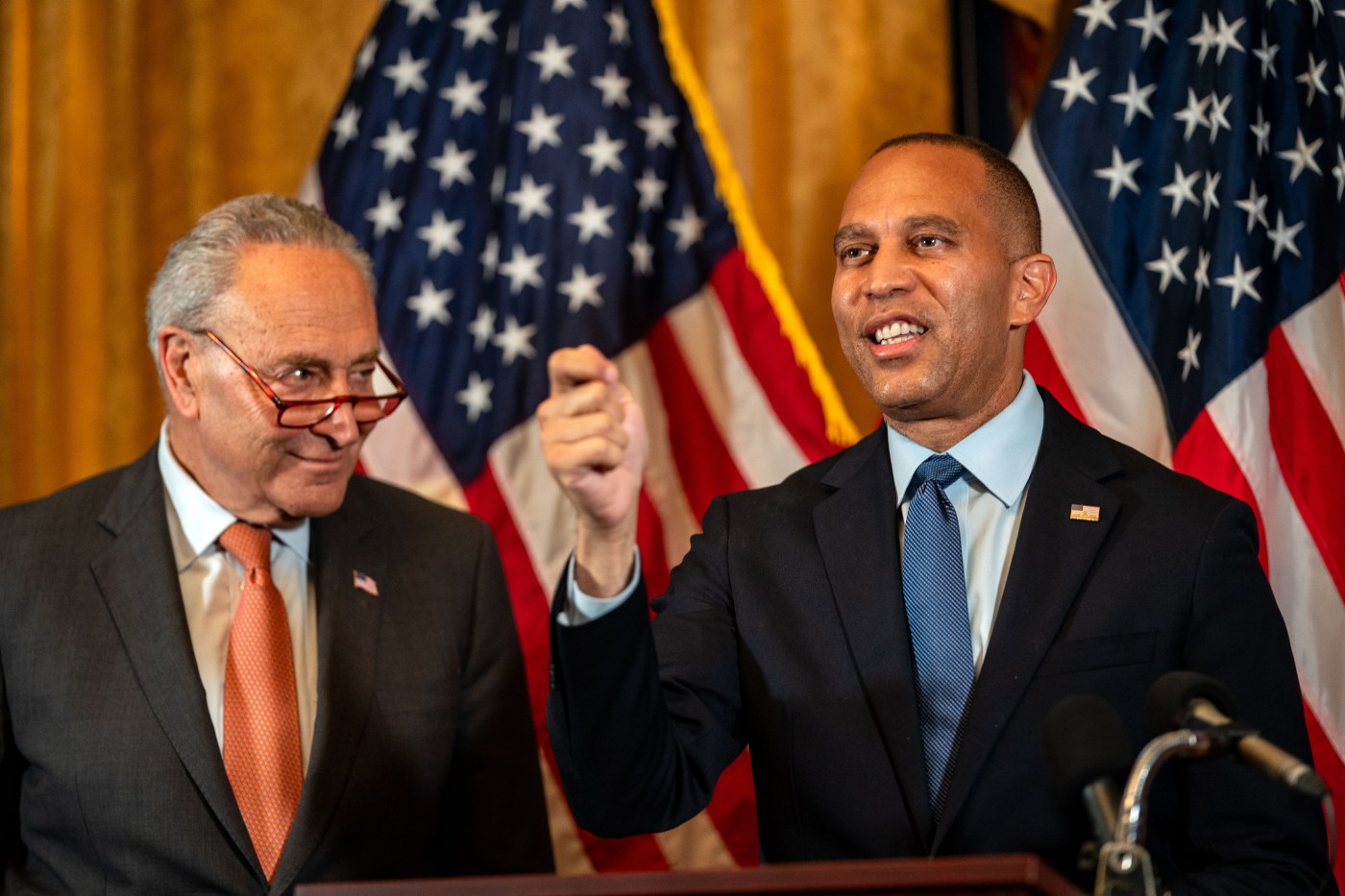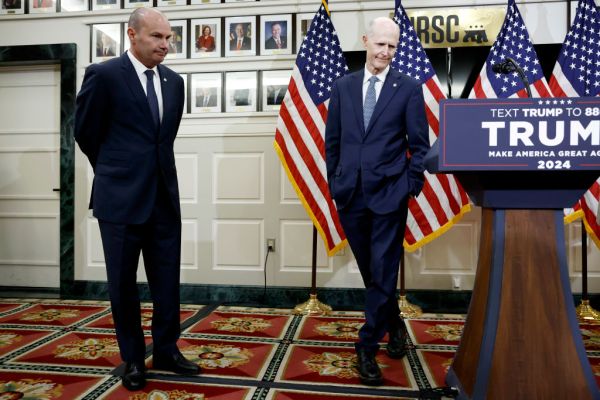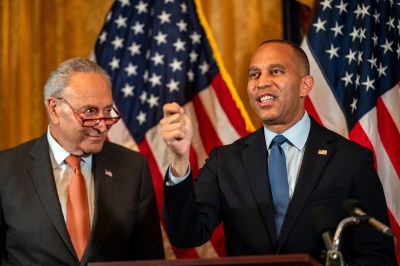When it comes to gridlock, I am—within reason—an enthusiast. A connoisseur, even. Oodles of Americans are low-key gridlock aficionados, too. In one of those utterly predictable cases of stated preferences at odds with revealed preferences, Americans say they want less gridlock in Washington but actually vote very frequently (and in a predictable pattern) for divided government and, hence, for the gridlock that comes with it.
But the Democrats are doing something a little unusual in 2024: They are running on gridlock. And Democrat-on-Democrat gridlock at that.
Quietly and off-the-record, of course.
Kamala Harris doesn’t say she wants divided government, and she probably doesn’t actually want divided government, either. But Harris’ allies in Congress and in the broader Democratic world are making a curious, cynical argument about the economic crazy-talk coming out of her campaign: Don’t worry about the nutty stuff—the price controls and all that—because none of it will get through Congress.
Harris has big dreams for new price-gouging legislation (i.e., a federal law that would attempt to supplant by fiat the basic dynamics of supply and demand). But her allies tell Politico:
Such a bill has no chance of passing Congress anytime soon, even if Democrats win the White House and Congress this November, according to six Democratic lawmakers and five Democratic aides who were granted anonymity to discuss the matter candidly. These people said Democrats in Congress have privately been telling critics that this part of the Harris plan is not viable.
Rather, they’ve argued it’s a messaging tactic—a way to show that she understands food prices remain an economic burden for many Americans and to redirect voters’ anger about inflation to corporations, in a way that progressives in particular have cheered.
One must almost admire the cynicism there: This isn’t real and it doesn’t matter, it’s just rube-bait for our voters, who aren’t smart enough for us to talk to like functional adults about our actual policy goals.
Nice.
That aside, the careful reader will notice that Harris’ friends are making a case for Democrat-led gridlock. Which is to say, they are asking Americans to take it on faith that Harris’ worst and battiest and leftiest ideas are going to be blocked by congressional Democrats, whose ranks are filled by such sensible and economically sophisticated people as … Alexandria Ocasio-Cortez and Elizabeth Warren.
But if you can temporarily liberate yourself from partisan blinders, then you can follow this line of thinking through to its logical conclusion. If what Americans really need is President Harris hemmed in by an uncooperative Congress, then what Americans really need is a Republican-led Congress.
Instead of a legislative branch under the leadership of such estimable worthies as Hakeem Jeffries and Chuck Schumer, how about such trustworthy and totally normal Republican-variety human beings as coup-strategist Mike Johnson and—I don’t have a great modifier here—Matt Gaetz? Marjorie Taylor Greene? J.D. Vance?
I know: It doesn’t sound so great when you put it that way! But you get the point.
I knew I was going to miss Mitch McConnell, but I didn’t think I would see Democrats secretly hoping for a Senate leader who would ruthlessly undermine Harris’ agenda if she is elected.
If I thought for a second that these anonymity-demanding Democrats were serious about Congress’ rediscovering its self-respect to such an extent that a President Harris would have to worry a great deal about the opposition of her own party, I’d cheer. But that isn’t how Washington works right now. And it isn’t how Congress works, either, which is more specifically to the point.
From the Newt Gingrich years to the speakership of Nancy Pelosi, control over the legislative agenda has been wrested from motley and rivalrous collections of congressional grandees and committee chairmen. It has instead been granted to a tiny handful of party leaders, to such an extent that the House speaker and Senate majority leader now have something close to total control over the actions of their caucuses.
Though the difference may be subtle, a negotiation between a Democratic president and a Democratic majority in Congress is not equivalent to a negotiation between a Democratic president and two Democratic congressional leaders with relatively narrow parochial interests. Considerations such as regional differences and competing constituency interests get flattened and compressed into the crude and simple calculation of D vs. R. That has many unhappy consequences, one of which is that it is difficult to have much confidence that a Democratic congressional majority would or could effectively contain even the most imbecilic policy ideas the Harris campaign has put forward.
It would be better to have some decent Democrat-aligned economist come into Harris HQ and beat staffers over the head with an Econ 101 syllabus until they internalize a few simple facts. If you are concerned about housing prices being too high, for example, then pushing down mortgage interest rates and subsidizing housing purchases is precisely the wrong policy. If you are worried about consolidation in the food industry, then handing down an expensive new set of federal mandates and regulations is precisely the wrong policy. After all, big, powerful market incumbents absolutely love expensive regulations, which add only marginally to their own already considerable legal overhead while suffocating potential new rivals that may be more innovative and nimble but lack a 98-person legal department or the present means to pay for one. Surely somebody Democrats would listen to could explain that to the Harris team.
And that’s what you want. Because if you’re worried that somebody might be on the verge of doing something stupid and your best hope is that Congress won’t do something stupid and that it will transcend partisan considerations to avoid said stupidity … well, I have some bad news for you, Sunshine.







Please note that we at The Dispatch hold ourselves, our work, and our commenters to a higher standard than other places on the internet. We welcome comments that foster genuine debate or discussion—including comments critical of us or our work—but responses that include ad hominem attacks on fellow Dispatch members or are intended to stoke fear and anger may be moderated.
With your membership, you only have the ability to comment on The Morning Dispatch articles. Consider upgrading to join the conversation everywhere.